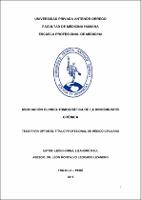Asociación clínico-tomográfica de la rinosinusitis crónica

Ver/
Descargar
(application/pdf: 940.7Kb)
(application/pdf: 940.7Kb)
Fecha
2018Autor(es)
León Horna, Lizandro Paul
Metadatos
Mostrar el registro completo del ítemResumen
OBJETIVOS: Determinar la concordancia entre el grado de severidad del
diagnóstico clínico y el diagnóstico tomográfico de la rinosinusitis crónica.
MATERIALES Y MÉTODOS: Se llevó a cabo un estudio observacional, analítico,
de corte transversal; que incluyó a 260 pacientes con diagnóstico de rinosinusitis
crónica del Hospital Víctor Lazarte Echegaray, que contaron con tomografía de
senos paranasales informada. Los datos se obtuvieron de la historia clínica
utilizando el instrumento de recolección de datos creado por los autores para
estimar la severidad clínica, y la escala de Lund-Mackay modificada para la
severidad tomográfica. La concordancia entre la severidad de ambos
diagnósticos fue estimada con la prueba Índice de Kappa con índice de confianza
al 95%.
RESULTADO: La edad media fue 54.2 ± 14.66 años. Fueron 61.5% pacientes
mujeres y 38.5% varones. Se encontró una concordancia k=0.02 entre los
diagnósticos clínico y tomográfico de severidad de la RSC con IC 95% [-0.07-
0.10], p>0.05. La cirugía previa otorrinolaringológica, tabaquismo, diabetes
mellitus y poliposis nasal mostraron un valor de p<0.05.
CONCLUSIONES: El estudio de la concordancia entre el grado de severidad del
diagnóstico clínico y el diagnóstico tomográfico de la rinosinusitis crónica,
permite inferir que ambos diagnósticos tienen una concordancia leve o
insignificante para la evaluación del grado de severidad del diagnóstico de
rinosinusitis crónica. OBJETIVE: To determine the concordance between the severity degree of the
clinical diagnosis and the tomographic diagnosis of chronic rhinosinusitis.
MATERIAL AND METHODS: An observational, analytical, cross-sectional study
was carried out; which included 260 patients diagnosed wit h chronic
rhinosinusitis at Víctor Lazarte Echegaray Hospital, who had an informed sinuses
tomography. The i nformation was obtained from the clinical history using the data
collection instrument created by the authors to estimate the clinical severity, and
the modified Lund-Mackay scale for the tomographic severity. The correlation
between the concordance of both diagnoses was estimated with the Kappa Index
test with 95% confidence index
RESULTS: The average age was 54.2 ± 14.66 years. There were 61.5% female
patients and 38.5% male patients. It was found a k=0.02 concordance between
the severity clinic and tomographic diagnose with a 95% CI [-0.07 - 0.10], p>0.05.
Previous otorhinolaryngology surgery, smoking, diabetes mellitus and nasal
polyps showed a p<0.05 value
CONCLUSIONS: The study of the concordance between the severity degree of
the clinical diagnosis and the tomographic diagnosis of chronic rhinosinusitis,
allows inferring that both diagnoses have a slight or insignificant concordance for
the evaluation of the severity degree of the diagnosis of chronic rhinosinusitis.
Palabras clave
Colecciones
- Medicina Humana [2969]

